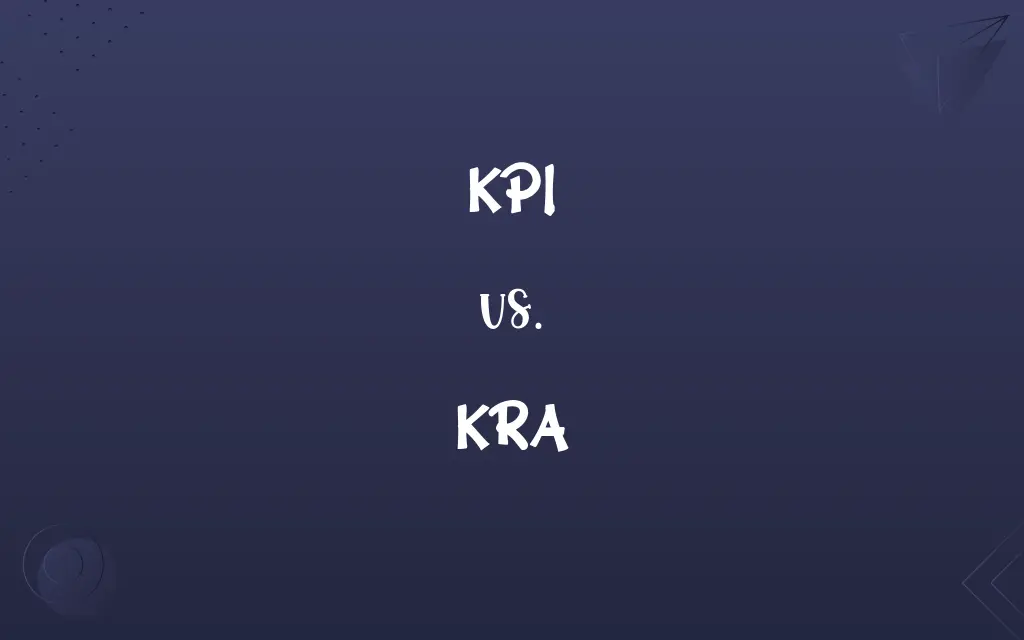KPI vs. KRA: Know the Difference

By Shumaila Saeed || Published on January 19, 2024
KPIs (Key Performance Indicators) are specific metrics used to measure the effectiveness of an organization in achieving key objectives, while KRAs (Key Result Areas) are the critical areas of outcome or output for which an employee is responsible.

Key Differences
KPIs are metrics used to quantitatively measure the success of an organization in specific areas that are critical for its performance. KRAs, on the other hand, define the scope of job responsibilities, outlining the fields or areas within which an employee is expected to deliver results.
Shumaila Saeed
Jan 19, 2024
KPIs serve as performance measurement tools, often used in evaluating the effectiveness of various activities within an organization. KRAs are more about defining the areas where an employee needs to deliver, focusing on the expected outcomes or results of their work.
Shumaila Saeed
Jan 19, 2024
KPIs are quantifiable, specific, and often tied to strategic goals or objectives. They provide measurable values that can be compared against a standard or target. KRAs, in contrast, are broader and describe the general areas of responsibility or expected results, not necessarily in quantitative terms.
Shumaila Saeed
Jan 19, 2024
In management, KPIs are used for performance appraisal, strategic management, and operational improvement. KRAs are used for setting clear job expectations, role clarity, and aligning individual roles with the organization's goals.
Shumaila Saeed
Jan 19, 2024
Examples of KPIs include sales revenue, customer retention rates, and employee productivity. KRAs might include customer satisfaction, project management, and team leadership.
Shumaila Saeed
Jan 19, 2024
ADVERTISEMENT
Comparison Chart
Definition
Specific metrics measuring performance effectiveness
Critical areas of outcome or output for responsibility
Shumaila Saeed
Jan 19, 2024
Purpose
To evaluate success in achieving key objectives
To define scope of job responsibilities
Shumaila Saeed
Jan 19, 2024
Nature
Quantitative, specific, measurable
Broader, outcome-focused, not always quantifiable
Shumaila Saeed
Jan 19, 2024
Usage in Management
Performance appraisal, strategic management
Setting job expectations, role clarity
Shumaila Saeed
Jan 19, 2024
Examples
Sales revenue, customer retention, productivity
Customer satisfaction, project management, team leadership
Shumaila Saeed
Jan 19, 2024
ADVERTISEMENT
KPI and KRA Definitions
KPI
KPIs often reflect strategic objectives of the organization.
A key KPI for a retail business might be same-store sales growth.
Shumaila Saeed
Jan 09, 2024
KRA
KRAs define the scope and main areas of responsibility in a job role.
In customer service, a KRA could be maintaining high customer satisfaction levels.
Shumaila Saeed
Jan 09, 2024
KPI
KPIs are used to evaluate factors critical to the success of an organization.
Employee turnover rate is a KPI used to assess a company's HR policies.
Shumaila Saeed
Jan 09, 2024
KRA
KRAs align individual performance with organizational goals.
For a content creator, a KRA might include producing a certain number of articles per month.
Shumaila Saeed
Jan 09, 2024
KPI
KPIs are measurable values that demonstrate how effectively a company is achieving key business objectives.
The company's KPI for customer service was the average response time to customer inquiries.
Shumaila Saeed
Jan 09, 2024
ADVERTISEMENT
KRA
KRAs focus on the quality and efficiency of work in key areas.
One of the KRAs for an HR manager is to improve employee engagement and retention.
Shumaila Saeed
Jan 09, 2024
KPI
KPIs provide benchmarks and targets for teams and individuals.
The marketing team's KPI was the number of leads generated per quarter.
Shumaila Saeed
Jan 09, 2024
KRA
KRAs are areas where an employee is expected to deliver outcomes or results.
For a sales manager, a KRA might be expanding the customer base.
Shumaila Saeed
Jan 09, 2024
KPI
KPIs track the performance of various aspects of a business.
A common KPI in sales is the monthly total of new contracts signed.
Shumaila Saeed
Jan 09, 2024
KRA
KRAs help in setting and clarifying job expectations for employees.
A KRA for a project manager may involve successful project delivery within set timelines.
Shumaila Saeed
Jan 09, 2024
KRA
A long-tailed ape (Macacus cynomolgus) of India and Sumatra. It is reddish olive, spotted with black, and has a black tail.
Shumaila Saeed
Jan 05, 2024
Repeatedly Asked Queries
How is a KRA different from a KPI?
KRA defines key areas of responsibility, while KPI measures the effectiveness of achieving specific goals.
Shumaila Saeed
Jan 19, 2024
How do organizations select their KPIs?
KPIs are selected based on strategic goals and critical success factors of the organization.
Shumaila Saeed
Jan 19, 2024
Is customer satisfaction a KPI or a KRA?
It can be both, depending on how it's measured and applied in the organizational context.
Shumaila Saeed
Jan 19, 2024
What's the main purpose of a KPI?
To measure and evaluate the effectiveness of an organization in achieving key objectives.
Shumaila Saeed
Jan 19, 2024
Are KRAs always quantifiable?
No, KRAs are not always quantifiable; they focus more on areas of responsibility and expected outcomes.
Shumaila Saeed
Jan 19, 2024
Can KPIs be used for individual performance evaluation?
Yes, KPIs are often used to assess individual performance against set benchmarks.
Shumaila Saeed
Jan 19, 2024
Do KRAs change with job roles?
Yes, KRAs vary according to the specific responsibilities and objectives of different job roles.
Shumaila Saeed
Jan 19, 2024
Can a KPI be linked to multiple KRAs?
Yes, a single KPI can relate to multiple KRAs, reflecting its impact across various areas.
Shumaila Saeed
Jan 19, 2024
How often are KRAs reviewed in a professional setting?
KRAs are typically reviewed annually, but this can vary depending on the organization.
Shumaila Saeed
Jan 19, 2024
How do KPIs affect decision-making in a business?
KPIs provide data-driven insights that inform strategic decisions and operational improvements.
Shumaila Saeed
Jan 19, 2024
What role do KPIs play in employee motivation?
Well-set KPIs can motivate employees by providing clear targets and recognizing achievements.
Shumaila Saeed
Jan 19, 2024
Can KPIs help in strategic planning?
Yes, KPIs are crucial for strategic planning as they provide measurable targets and success indicators.
Shumaila Saeed
Jan 19, 2024
Who is responsible for defining KRAs?
KRAs are usually defined by management or HR, in consultation with the relevant department heads.
Shumaila Saeed
Jan 19, 2024
Are KRAs important for employee appraisals?
Yes, KRAs play a significant role in setting expectations and assessing employee performance.
Shumaila Saeed
Jan 19, 2024
Are KPIs industry-specific?
While some KPIs are universal, many are tailored to specific industries or business models.
Shumaila Saeed
Jan 19, 2024
How detailed should a KRA be?
A KRA should be clear and detailed enough to give a precise understanding of the expected outcomes.
Shumaila Saeed
Jan 19, 2024
What's the impact of not meeting KRAs?
Not meeting KRAs can lead to performance issues and may affect career progression.
Shumaila Saeed
Jan 19, 2024
Do KRAs help in employee training and development?
Yes, by clarifying expected outcomes, KRAs can guide employee training and development needs.
Shumaila Saeed
Jan 19, 2024
Can KPIs change over time?
Yes, KPIs may evolve as business goals and market conditions change.
Shumaila Saeed
Jan 19, 2024
Can KRAs and KPIs overlap?
Yes, there can be overlap, as KPIs are often used to measure success in achieving the outcomes defined by KRAs.
Shumaila Saeed
Jan 19, 2024
Share this page
Link for your blog / website
HTML
Link to share via messenger
About Author
Written by
Shumaila SaeedShumaila Saeed, an expert content creator with 6 years of experience, specializes in distilling complex topics into easily digestible comparisons, shining a light on the nuances that both inform and educate readers with clarity and accuracy.









































































